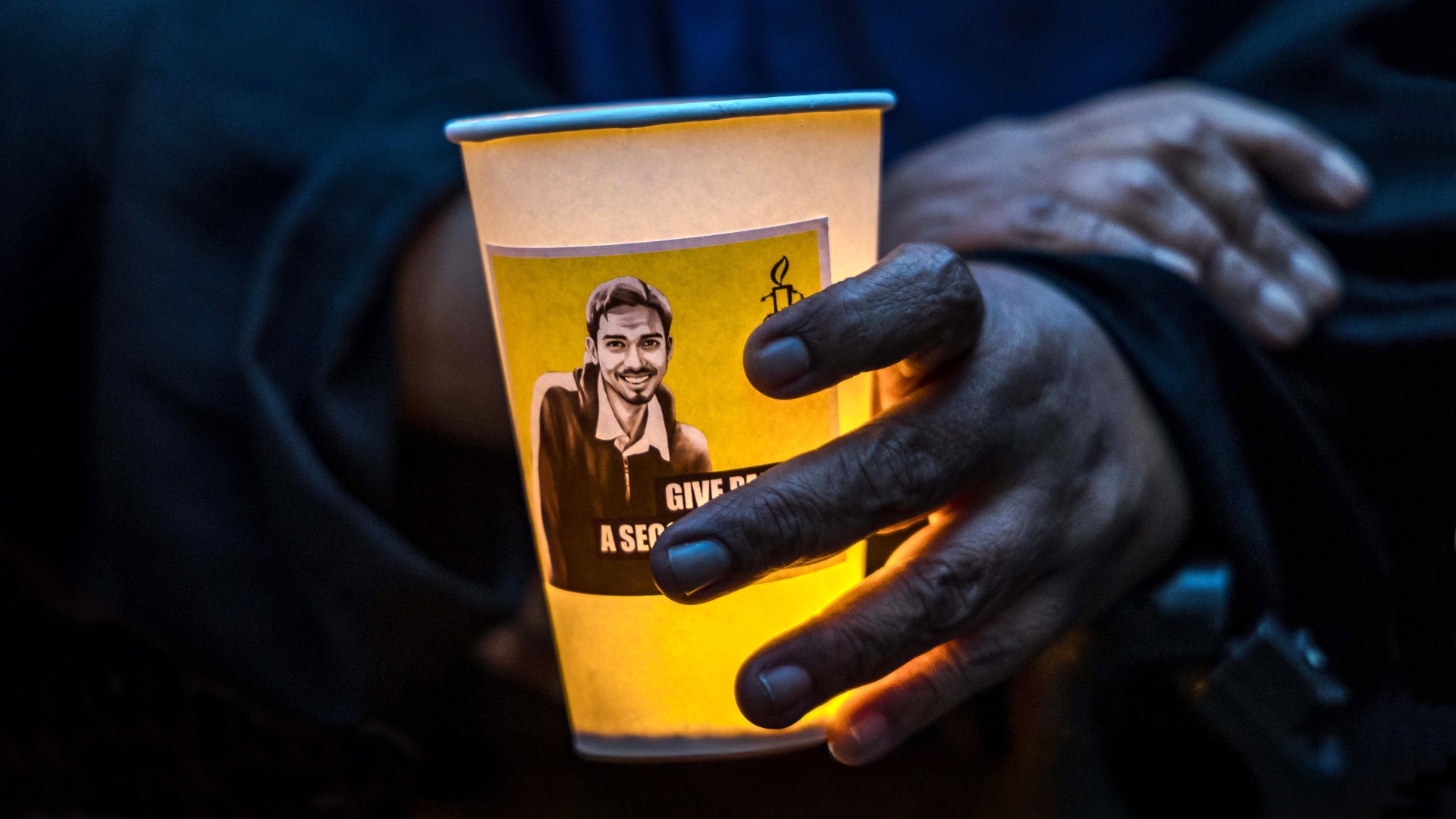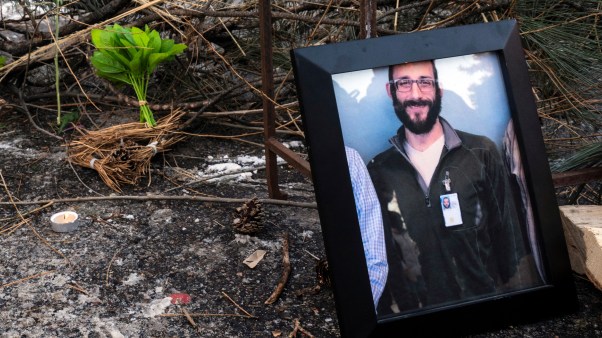October 10, 2025
On October 8, Singapore hanged Pannir Selvam Pranthaman.
The Southeast Asian country’s High Court first sentenced the 38-year-old to death in 2017 for importing 51.84 grams of heroin from Malaysia to Singapore. Pannir, a pastor’s son who was baptized while in prison, received two stays of execution in the last few years. He submitted one final appeal against his death sentence, but the Singapore court dismissed the appeal on October 7. A Singaporean judge said that there was “no basis” to grant Pannir another stay of execution.
When Pannir learned of his execution date, he told his siblings what he wanted to wear for his final photo shoot: the latest Manchester United jersey and a pair of jeans, according to a report by Singapore newsletter We, The Citizens.
“The outcome may not be what we [had hoped] for, but let it not diminish the richness of the journey we went through,” Pannir wrote in a letter to his lawyer Too Xing Ji on October 3. “God will be with you n’ your family.”
Pannir lived with “deep reflection, prayer, and purpose,” his older sister, Sangkari, said at his funeral at the Word of Life Centre Church in Perak, Malaysia, on October 10. “I want to remind others that change is possible, even from the darkest place. That’s who my brother was, a man of faith, compassion and courage.”
Malaysian human rights lawyer Andrew Khoo felt a deep sense of resignation when he heard about Pannir’s impending execution. He prayed for God to halt the execution and for Pannir to know God’s love for him with “great confidence.”
“Many things are done on earth in the purported name of justice,” Khoo told Christianity Today. “But we are a flawed people.”
Prior to Pannir’s execution, groups had assembled outside Singapore’s High Commission to hold candlelight vigils. Some people bore a large yellow banner with the words “Stop the Executions” in big, bold letters.
Pannir’s death is the 12th execution to take place in Singapore this year. A few days before Pannir’s execution, Singapore hanged another Malaysian, K. Datchinamurthy, for bringing 44.96 grams of diamorphine into Singapore. Datchinamurthy converted to Catholicism while in prison.
Last month, Pannir published a book of poetry in Malaysia titled Death Row Literature. He penned these poems while sitting on his prison cell’s cold floor with only a few sheets of paper at his disposal.
“Is justice in this world like the garden of Eden, / a place that you’ve heard exists, / but you can’t find a way to reach it?” Pannir wrote in a poem dated May 21, 2022. “Yet, still in hope, I am waiting / with open arms to welcome. / “Will justice finally come home?”
September 18, 2025
September 3, 2014, felt like any other ordinary day for Angelia Pranthaman—until the Malaysian national found out that Singapore’s police had arrested her older brother Pannir Selvam Pranthaman for trafficking drugs into the Southeast Asian country.
Singapore’s Immigration and Checkpoints Authority (ICA) officers stopped 27-year-old Pannir for a random search as he tried to cross the Malaysia-Singapore border at Woodlands Checkpoint, the world’s busiest land crossing. The officers discovered he was carrying diamorphine, or heroin.
Three years later, the High Court of Singapore convicted Pannir of importing 51.84 grams of heroin from Malaysia to Singapore and sentenced him to death, setting the execution for May 24, 2019.
But Pannir did not die that day and has remained on death row for the past eight years after experiencing two stays of execution.
On September 5, Singapore’s Court of Appeal dismissed Pannir’s most recent bid to halt his execution. This means that Pannir is again “at risk” of receiving an execution notice, Angelia told Union of Catholic Asian News.
Angelia felt heartbroken and deeply disappointed when she received news of the court ruling. “This decision was devastating,” she told Christianity Today. “At the same time, we felt a strange sense of calmness because we knew that God was still powerful even in this painful moment.”
Singapore is one of 34 countries in the world—like Iran, Saudi Arabia, and China—that punish drug offenses with a mandatory death penalty, which the country introduced in 1973. It has one of the world’s strictest drug laws—anyone caught trafficking 15 grams of heroin, 30 grams of cocaine, 250 grams of methamphetamine, or 500 grams of cannabis will face capital punishment.
Many Singaporean evangelicals in the country favor the death penalty, as they consider it a helpful and even necessary deterrent to the proliferation of drug-related crimes in the country. More than two-thirds (74.6%) of Protestants supported capital punishment, a 2018 research project revealed.
In Malaysia, some Christians feel otherwise, noting there is room to practice greater compassion in the criminal justice system. Just over half (54%) of Malaysian Protestants are not opposed to abolishing the mandatory death penalty, according to a 2013 survey. Two years ago, the country scrapped the mandatory death penalty for serious crimes, including drug trafficking.
To Angelia, Pannir’s sentence leaves no room for the redemptive arc she has seen in her brother’s life. “No one should be defined by the worst mistake made, and every human life has value and potential for redemption,” Angelia said.
Pannir was born in Ipoh, Malaysia. The son of a pastor, he attended Emmanuel Tamil Assembly Church, where he played the drums, guitar, and keyboard on the worship team. In 2010, he started working in Singapore while living in the nearby Malaysian city of Johor Bahru.
At a gambling den there, Pannir became friends with a man named Anand, who asked him to transport goods from Malaysia into Singapore. This led to Pannir’s arrest and 2017 conviction, as the Singapore High Court found insufficient evidence to prove Pannir was unaware of the contents of the goods he had transported.
The 2017 court judgment noted several inconsistencies in Pannir’s statements, which led the judge to question whether he was a “truthful witness.” For instance, Pannir originally said he had transported the goods because he needed money, but he later claimed it was Anand facing financial difficulties. Pannir also initially said he did not know what goods he was carrying, but he later claimed they were drugs or aphrodisiacs.
As the years on death row passed, Pannir spent more time praying and reading the Bible. In 2018, he got baptized in prison and took a new name, Paul Silas, according to the Singaporean Christian publication Salt&Light.
“I feel blessed and my heart can feel the joy that came from [God’s] salvation,” he wrote of his decision to get baptized. “My relationship with my family and God is being healed, and it [has become] stronger these past two years.”
Evangelicals in Singapore have largely avoided addressing Pannir’s case. Some, however, have written publicly in support of Singapore’s imposition of the death penalty.
Capital punishment is “a divine imperative and a pattern found in the Old Testament,” Edwin Wong, a pastor at True Way Presbyterian Church in Singapore, wrote in a 2018 post on his church website.
Mosaic law “legislates the death penalty for various transgressions,” Wong argued. Old Testament passages like Exodus 21, where God says a person who strikes another “with a fatal blow is to be put to death” (v. 12), and Leviticus 24, where anyone who “takes the life of a human being” or blasphemes God must be put to death (vv. 16–17), illustrate this principle in Wong’s view.
The New Testament also reflects the “appropriateness” of the death penalty, Wong noted. He cited Luke 23:41, where the thief on the cross humbly acknowledges that he is being punished justly.
Some Singaporean evangelicals view the death penalty as a useful measure to quell the escalation of vices in the country. International drug syndicates increasingly target Singaporeans under the age of 16 to become buyers or sellers, said Kent Ho, chairman of Christian nonprofit Loving Hand Fellowship, which supports drug offenders through counseling and addiction recovery.
“That is why the Singapore government has to be so firm in [its] stance on drug-related laws,” said Ho.
Other Singaporean Christians are less convinced of the death penalty’s effectiveness in discouraging serious crimes.
In 2018, the National Council of Churches of Singapore (NCCS), affiliated with the World Council of Churches, urged the Singaporean government to reconsider whether alternative forms of state punishment, such as life imprisonment, might achieve a comparable deterrent effect.
Citing Jesus’ response to the woman caught in adultery in John 8:1–11, NCCS stated, “We believe that the Scriptural position is best represented as neither mandating nor prohibiting the death penalty but rather permitting it.”
“The government has the authority to impose the death penalty, but is not necessarily under obligation to do so,” the statement continued. The Singapore government did not respond to NCCS’s statement.
Some Malaysian evangelicals echoed NCCS’s position on the death penalty.
Humanity is created in the image of God, and God wants to restore his image in us rather than seek retribution against those who have destroyed it, said Davin Wong (no relation to Edwin Wong), a finance manager who worships at Bangsar Lutheran Church in Kuala Lumpur.
Countries with a mandatory death penalty “should consider moving from a mandatory to a discretionary death penalty and learn from other countries, such as those with European legal systems that lean towards rehabilitation and correction,” Wong added.
A new date of execution for Pannir may be imminent after the Singapore court rejected his appeal earlier this month, said Malaysian human rights lawyer Andrew Khoo.
Pannir and his family maintain that he cooperated with Singapore’s law enforcement and gave the authorities useful information, Khoo said. “If so, he should be credited for assisting the police. This has not happened. We need to continue to fight that the truth will prevail.”
“We should not hope to avoid the consequences of our actions. That is justice,” Khoo added. “We can only pray for God’s mercy to flow to the authorities through the power of the Holy Spirit.”
When Pannir was first arrested in 2014, Angelia could not understand why this had happened to her family. “But I gradually began to realize that God is fighting this battle with us,” she said.
Over the years, God has intervened in Pannir’s case in miraculous ways, Angelia shared. The day before Pannir was to represent himself in court to appeal his 2019 sentence, two lawyers in Singapore approached the family to help and successfully called for a stay of execution.
Then, in February as the Pranthamans fasted and kneeled in prayer, Singaporean authorities granted Pannir another stay one day before the execution was to take place.
Two Bible verses have served as a lifeline for the Pranthaman siblings in this season. One is Psalm 46:1, which declares that God is a “refuge and strength,” a very present “help in trouble.” A Malaysian evangelical pastor had written this verse in a card for Pannir, who placed it on his cell wall. Pannir meditates on the verse regularly because it comforts him, Angelia said.
Angelia, meanwhile, clings to Jeremiah 33:3, which says, “Call to me and I will answer you and tell you great and unsearchable things you do not know.”
During one prison visit with Pannir, the siblings excitedly discussed how God had repeatedly done the unexpected, like how Moses and the Israelites escaped Pharaoh by crossing the Red Sea in Exodus 14.
“We were constantly reminded [of] how our human mind is not God’s mind,” she said.
Pannir, now 38, continues to evangelize fellow inmates and write music and poetry from his prison cell.
“I believe God has a purpose and has His will in my life,” Pannir wrote in a 2019 plea for clemency to Singapore’s former president Halimah Yacob, a plea Yacob rejected. “This journey of my life has taught me to seek His will more than … mine.”
After the court rejected Pannir’s appeal this September, Angelia and her family continue to explore legal options, although they recognize that opportunities for clemency are slim. For now, the Pranthamans focus on supporting Pannir spiritually and emotionally.
“I pray with tears, asking God to strengthen Pannir Selvam, to give him peace and courage inside prison, and also to help us not to lose faith,” Angelia said. “I also pray that God will turn this situation into a testimony of his power and mercy, [even] when everything seems hopeless.”
Additional reporting by Isabel Ong



















